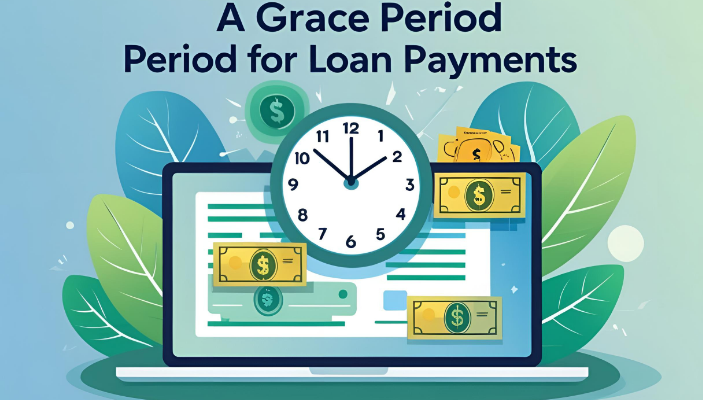When you borrow money—whether it’s for a student loan, credit card, car loan, or mortgage—you usually agree to make payments by a specific due date. However, many lenders offer a grace period. This is a short time window after the due date during which you can still make your payment without facing penalties.
In simple terms, the grace period gives you a little breathing room. But not all loans offer one, and the rules can vary depending on the lender and type of loan.
Why Grace Periods Exist
Lenders know that life can be unpredictable. You might forget a due date, have unexpected expenses, or simply need a few extra days before payday. Grace periods are designed to:
- Provide a buffer before late fees are applied
- Support borrowers during temporary cash flow issues
- Help protect your credit score if payment is made shortly after the due date
They are a helpful feature—but should never be relied on regularly.
How Long Is the Grace Period?
There’s no single answer—it depends entirely on the type of loan and the institution offering it. Here’s a quick overview of common loan types:
1. Credit Cards
- Most credit card companies offer a 21 to 25-day grace period on purchases.
- This period applies only if you pay your balance in full each month.
- If you carry a balance, interest begins accruing immediately—no grace period.
2. Student Loans
- Federal student loans typically offer a 6-month grace period after graduation, leaving school, or dropping below half-time enrollment.
- Private student loans may have shorter or no grace periods at all.
3. Auto Loans
- Auto lenders may offer a 7 to 15-day grace period.
- Some dealerships allow payment flexibility, but this varies widely.
- Interest usually still accrues during the grace period.
4. Mortgages
- Mortgage lenders often provide a 15-day grace period.
- Payments made by the end of this window are usually not subject to late fees.
- After that, a late fee—usually a percentage of your payment—is added.
5. Personal Loans
- These vary the most, but a 5 to 10-day grace period is typical.
- You must read the terms carefully or speak with your loan officer.
Does Interest Still Accrue During the Grace Period?
Yes, in many cases, interest continues to accrue during the grace period—especially for loans like car loans, personal loans, and mortgages. That means even though you’re not being penalized with a fee or credit report impact, the amount you owe could increase slightly.
However, some student loans—especially subsidized federal loans—do not accrue interest during their grace periods.
What Happens If You Miss the Grace Period?
Once the grace period ends:
- Late fees are applied (these can range from $15 to 5% of the payment amount)
- Credit reporting agencies may be notified (usually if payment is more than 30 days late)
- Interest charges can increase your total repayment cost
- Default status may eventually occur if payments are skipped for several months
It’s always best to aim for on-time payments, even within the grace window, to avoid these risks.
Can You Extend a Grace Period?
Some lenders allow you to request an extension if you’re experiencing hardship. You might:
- Call your lender and explain your situation
- Request a temporary payment plan
- Apply for loan forbearance or deferment (especially with student loans)
These aren’t guaranteed, but lenders often prefer to work with borrowers who communicate early.
How Grace Periods Affect Your Credit Score
Making a payment during the grace period usually won’t hurt your credit. Most lenders don’t report missed payments until you’re at least 30 days past due.
However, a consistent pattern of delayed payments—even within the grace window—could raise red flags if your lender decides to evaluate your payment behavior for future credit decisions.
Tips to Stay Ahead of Loan Deadlines
Here are some helpful strategies to ensure you don’t rely too heavily on grace periods:
- Set up automatic payments with your bank or lender
- Use payment reminder apps or calendar alerts
- Review your loan terms carefully before signing any agreement
- Build an emergency savings buffer to cover loan payments when income is tight
Why You Shouldn’t Depend on Grace Periods Regularly
While it’s comforting to have a few extra days, grace periods are not meant to be used as a safety net every month. They’re designed to help you in emergencies—not to create a new due date.
Relying on them repeatedly can:
- Lead to poor financial habits
- Increase your total interest charges
- Put you at risk of accidental late payments
Building a responsible loan payment strategy is essential for long-term financial health.
Conclusion: Know Your Loan’s Terms and Plan Ahead
Grace periods can be incredibly helpful when used wisely, but every loan and lender has different rules. Always read your agreement thoroughly and ask your lender about:
- The exact length of the grace period
- Whether interest accrues during that time
- How are late fees calculated
- When payments begin affecting your credit
Frequently Asked Questions
1. Do all loans have a grace period?
No, not all loans offer a grace period. Credit cards and student loans often do, while some personal and auto loans may not. It depends entirely on the lender’s policy and the loan agreement terms.
2. Will a late payment within the grace period affect my credit score?
Usually, no. Most lenders don’t report to credit bureaus unless a payment is over 30 days past due. Payments made within the grace period are typically safe from credit score damage—but it’s best not to make it a habit.
3. Does interest build up during the grace period?
In many cases, yes—especially for auto, mortgage, and personal loans. However, federal subsidized student loans often do not accrue interest during their grace period. Always check your loan terms.
4. Can I request a longer grace period if I’m struggling financially?
Sometimes. If you’re facing hardship, reach out to your lender as soon as possible. They may offer payment extensions, forbearance, or other short-term solutions—but it’s up to them.
5. What happens if I miss the grace period deadline?
After the grace period ends, your lender may apply late fees, raise your interest, or even report the missed payment to credit bureaus. Continued non-payment can lead to default and damage to your credit.




